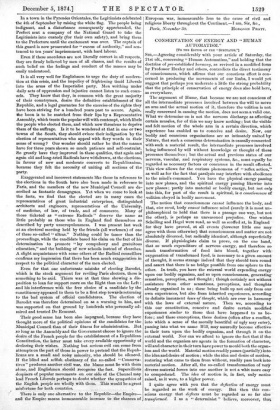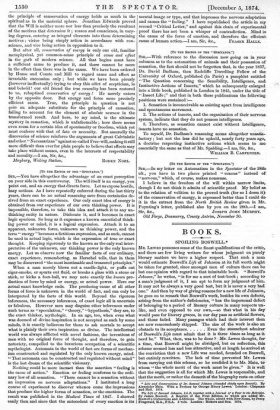CONSERVATION OF ENERGY AND "HUMAN AUTOMATISM."
[TO THE EDITOR OF !RR SPRCTATOR.1
Sin,—Agreeing considerably with your article of Saturday, the 21st ult., concerning " Human Automatism," and holding that the doctrine of pre-established harmony, as revived in a modified form by Professor Huxley and others, contradicts the direct testimony of consciousness, which affirms that our conscious effort is con- cerned in producing the movements of our limbs, I would yet suggest that perhaps you underrate a little the strong probability that the principle of conservation of energy does also hold here, as everywhere.
The argument of Hume, that because we are not conscious of all the intermediate processes involved between the will to move an arm and the actual motion of it, therefore the volition is not really concerned in causing the motion, does not seem a valid one. What we determine on is not the nervous discharge as affecting certain muscles, for of this we may know nothing ; but the visible and felt motion of the whole arm in a certain direction, which experience has enabled us to conceive and desire. Now, our bodily and conscious organisations are so intimately united by Nature, that such a conscious determination is causally connected with such a material result, the intermediate processes involved being influenced by will without knowledge or thought of these processes themselves ; but the actual and previous states of our nervous, vascular, and respiratory systems, &c., must equally be regarded as necessary factors or concauses in the result effected. This view allows for the curious phenomena of "reflex action," as well as for the fact that paralysis may interfere with obedience to the mind's command. You have the physical energy passing into new phases, and the spiritual energy passing likewise into new phases ; partly into material or bodily energy, but not only into this, for part of the result is spiritual, is a consciousness of volition obeyed in bodily movement.
The notion that consciousness cannot influence the body, and that, vice versa, body cannot influence mind (surely it is most un- philosophical to hold that there is a passage one way, but not the other), is perhaps an unreasoned prejudice. One wishes Schelling and Hegel were read, as well as scoffed at, in England for they have proved, at all events (however little one may agree with them otherwise) that consciousness and matter are not absolutely divorced, but radically identical, although superficially diverse. If physiologists claim to prove, on the one hand, that so much expenditure of nervous energy, and therefore so much transformation of food into blood, together with oxygenation of transformed food, is necessary to a given amount of thought, it seems strange indeed that they should turn round and assert that there is no bridge possible from one sphere to the other. In truth, you have the external world expending energy upon our bodily organism, and so upon. consciousness, generating sensation, perception, and thought ; though certainly not without assistance from other sensations, perceptions, and thoughts already organised in us; these being built up not only from our own experiences, but also from inherited experiences, according to definite immanent laws of thought, which are ever in harmony with the laws of external nature. Then we, according to this our constitution, conceive and desire certain modified experiences similar to those that have happened to us be- fore ; and these conceptions, these desires (often after a conflict, into which a sense of the morally beautiful or ugly may enter), passing into what we name Will, may assuredly become effective in their turn upon the bodily organism, and through it on the external world. Nor can we afford to ignore the feet that if the world and the organism are agents in the formation of character, will and character in their turn have power to mould both the organ- ism and the world. Material motion readily passes (partially) into the idea and desire of motion ; while the idea and desire of motion, restoring what came to them from without, readily pass back into material motion. After all, the so-called transformation of very diverse material forces into one another is not a whit more easy to comprehend. The idea of motion is, in fact, only motion raised, as it were, to a higher power.
I quite agree with you that the deflection of energy must be regarded as the work of energy. But then this con- scious energy that deflects must be regarded as so far also transformed. I as a " determinist " believe, moreover, that
the principle of conservation of energy holds as much in the spiritual as in the material sphere. Jonathan Edwards proved that the Will is neither more nor less than precisely the resultant of the motives that determine it ; reason and conscience, in vary- ing degrees, entering as integral elements into these determining motives ; virtue being simply action in accordance with con- science, and vice being action in opposition to it.
But after all, conservation of energy is only our old, fsmilisr metaphysical, yet common-sense principle of cause and efect in the garb of modern science. All that begins must have a sufficient cause to produce it, and there cannot be more in the effect than there was in the cause. We have been ordered by Hume and Comte and Mill to regard cause and effect as invariable succession only ; but while we have been piously (however ineffectually) trying to obey this edict of scepticism, lo and behold! our old friend the true causality has been restored to -us, rebaptised conservation of energy I He merely enters by the opposite door. But energy and force mean precisely efficient cause. True, the principle in question is not quite an adequate substitute for the principle of causation, failing to account for the element of absolute newness in the transformed result. And here, to my mind, is the ultimate mystery in causation, which is unfathomable ; here there seems even room for a certain idea of spontaneity or freedom, which yet must coalesce with that of fate or necessity. But assuredly the discoveries of science reinforce the arguments of great Calvinistic and other." Necessarians " against so-called Free-will, making it still more difficult than ever for plain people to believe that effects may take place without muses, even in the interests of respectability and morality.—I am, Sir, &c.,



































 Previous page
Previous page